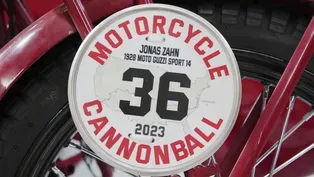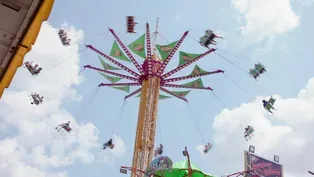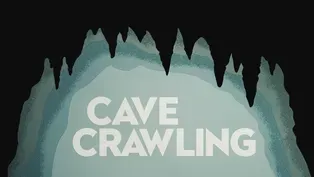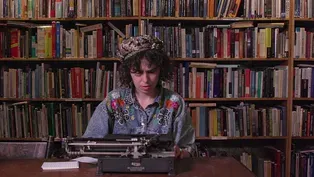
Saving Wisconsin's rare Ojibwe ponies
Clip: Season 11 Episode 4 | 4m 41sVideo has Closed Captions
Rare Ojibwe ponies thrive again through a Spring Valley preservation effort.
The Ojibwe pony, who traditionally lived alongside Anishinaabe people, now numbers fewer than 200. Known for their thick manes and sturdy build, these horses historically thrived in northern Wisconsin's dense woods. Through "The Humble Horse" in Spring Valley, founder Em Loerzel works to preserve this unique breed.
Problems with Closed Captions? Closed Captioning Feedback
Problems with Closed Captions? Closed Captioning Feedback
Wisconsin Life is a local public television program presented by PBS Wisconsin
Funding for Wisconsin Life is provided by the Wooden Nickel Fund, Mary and Lowell Peterson, A.C.V. and Mary Elston Family, Obrodovich Family Foundation, Stanley J. Cottrill Fund, Alliant Energy, UW...

Saving Wisconsin's rare Ojibwe ponies
Clip: Season 11 Episode 4 | 4m 41sVideo has Closed Captions
The Ojibwe pony, who traditionally lived alongside Anishinaabe people, now numbers fewer than 200. Known for their thick manes and sturdy build, these horses historically thrived in northern Wisconsin's dense woods. Through "The Humble Horse" in Spring Valley, founder Em Loerzel works to preserve this unique breed.
Problems with Closed Captions? Closed Captioning Feedback
How to Watch Wisconsin Life
Wisconsin Life is available to stream on pbs.org and the free PBS App, available on iPhone, Apple TV, Android TV, Android smartphones, Amazon Fire TV, Amazon Fire Tablet, Roku, Samsung Smart TV, and Vizio.
Providing Support for PBS.org
Learn Moreabout PBS online sponsorship[cheerful, folksy music, footsteps] - Angela Fitzgerald: As Em Loerzel walks by UW-River Falls' clock tower, she's starting a new time in her life.
- Em Loerzel: I'm a newly-minted PhD, and I was able to start at UW-River Falls in their social work department, and I feel really lucky.
- For Em, it's a dream job, where she can continue her social justice work, serving her Native community.
- Em: I'm really, really passionate about the wellness of my community.
Hi, boys!
Good morning!
- But in addition to a dream job, Em also finds herself fulfilling a dream for her people.
- It seems like Creator has a funny sense of humor.
I guess... now I do a lot of stuff with horses.
[chuckles] - Horses that were once in danger, she has now given a home.
- Em: This is the first home that we were ever able to buy.
We bought it more for the horses and less for us.
[carefree country guitar] This is "Grey Cloud."
- Em sees the horses as family.
- And then this is "Strawberry Ode'imini Giizis," the Strawberry Moon.
- This is " Misajidamoo."
That means "grey squirrel."
Her Ojibwe name is "Dimi."
- The horses have Ojibwe names because they are known as Ojibwe ponies.
- They're distinct.
They're a very distinct breed.
- Distinct and rare.
Fewer than 200 Ojibwe ponies remain.
[horses lips flutter, trainer makes clicking sound] [horse clip clops] The chance to work with the rare breed attracted Leah Witt, a recent graduate of UW-River Falls' Equine Science program.
- Leah Witt: They're a lot fuzzier than your average horse.
They have these really, really hairy little ears.
They also have this enormous, thick mane, and what that actually does is it keeps their veins and their arteries warm in the wintertime and cool in the summertime.
- Angela: Those features made the ponies well-adapted for the dense woods of northern Wisconsin, home to the Ojibwe people.
Traditionally, the ponies and people depended upon one another.
- Leah: They're pretty strong and sturdy for the size that they are, and so, that's what made them really excellent at pulling things out from woods and logging.
- Angela: But the ponies were more than workhorses.
Em says the connection between horse and human has a deep spiritual dimension.
[rooster crows] - Em: I would also argue that the ponies are our community, but ultimately, they are an extension of us, and we are an extension of them.
We are intertwined.
- Reforging that link has driven Em on her mission to restore the Ojibwe pony.
- Em: My question to you is, wouldn't you help your relative survive?
I would.
- But she doesn't do it alone.
The nonprofit group Em founded, the Humble Horse, is a growing movement.
- Em: This has been a community thing, because without community, both non-Indigenous, Indigenous, both equestrian and non-equestrian, right, we wouldn't be able to do what we do.
- Angela: That includes the Wrisky Ranch, which provides boarding and space for Leah to train the horses for riding.
An important step to their preservation.
- Leah: It's really hard to convince people that they should have these horses if they don't see them riding and doing things.
- Em: They don't just belong in museums, right?
They don't just belong in a history book.
We need to make sure that there's a future for them, too.
[folksy guitar] - Members of the Humble Horse herd have become ambassadors for the breed.
A visit to the River Falls campus, near Em's office, provided welcome relief during a stressful semester.
- Em: Maybe you can call it "multi-species social work."
[laughs] - Whatever you call it, the Humble Horse is making a difference for people and ponies.
- Em: I'm not an owner.
I don't own these horses, but I caretake for them And I'm lucky enough to do so.
[country folk music]
A long-haul race for redemption
Video has Closed Captions
Jonas Zahn and Brenda Kuhl race a 1928 Moto Guzzi in the 3,800-mile Cannonball race. (7m 6s)
Northern Wisconsin's State Fair celebrates 126 years of tradition
Video has Closed Captions
From the Ferris wheel to fair food, Chippewa Falls hosts a beloved summer tradition. (2m 24s)
A solitary journey through Carolyn's Caverns
Video has Closed Captions
Naturalist Jane Mingari guides a cave explorer through the passages of Carolyn's Caverns. (4m 10s)
'Writing is listening' Poet Anja Notanja Sieger types your story
Video has Closed Captions
Anja Notanja Sieger revives typewriter poetry by crafting poems live in public spaces. (5m 25s)
Providing Support for PBS.org
Learn Moreabout PBS online sponsorshipSupport for PBS provided by:
Wisconsin Life is a local public television program presented by PBS Wisconsin
Funding for Wisconsin Life is provided by the Wooden Nickel Fund, Mary and Lowell Peterson, A.C.V. and Mary Elston Family, Obrodovich Family Foundation, Stanley J. Cottrill Fund, Alliant Energy, UW...















